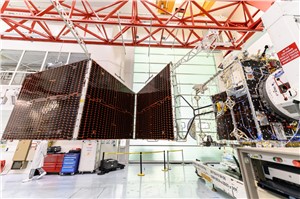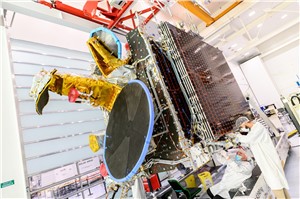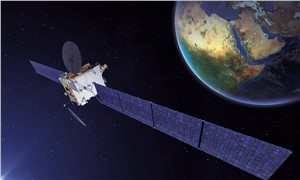One entire press release first
NILESAT 301 Communications Satellite Successfully Launched
NILESAT 301 communications satellite built by Thales Alenia Space, a joint venture between Thales (67%) and Leonardo (33%) for the Egyptian operator NILESAT was successfully launched today from Cape Canaveral launch pad, Florida (USA), on board of a SpaceX Falcon 9 rocket.
Thanks to a powerful Ku-band mission NILESAT 301 will reinforce NILESAT commercial leadership in broadcast services at 7°W over MENA and opening new services over Southern Africa and Nile Basin. In addition, a state-of-the art multibeam Ka band mission will support NILESAT entry in the broadband connectivity market over Egypt.
As prime contractor, Thales Alenia Space was responsible for satellite design, production, testing and in-orbit acceptance tests. NILESAT will also benefit from brand new satellite control facilities installed in Cairo and Alexandria, which are already operational to control NILESAT 201 in orbit.

Batteries for Space and Aerospace - Market and Technology Forecast to 2030
Market forecasts by by Region, Value type, Sales type, Market, End-user, Application, Satellite type, Satellite orbit, Aircraft market, and by UAV market. Technology and Market Overview, Market and Impact Analysis, and Leading Companies
Download free sample pagesThe satellite is based on the Spacebus 4000-B2 platform with about 4 metric tons at launch and a design life exceeding 15 years.
Following NILESAT 201, NILESAT 301 is the second geostationary communications satellite built by Thales Alenia Space for NILESAT. It is also the fourth payload developed by Thales Alenia Space for the Egyptian operator.
“We are delighted to continue supporting NILESAT in this growth by delivering customized satellite products with outstanding performance", said Hervé Derrey, CEO of Thales Alenia Space. “This achievement proves that our telecommunications offer perfectly replies to the telecom market’s needs and that we are perfectly capable of providing tailored solutions that meet each operator’s specific requirements, to enhance global connectivity and reduce the digital divide.”
Source: Thales
Date: Jun 10, 2022
View original News release






No comments:
Post a Comment